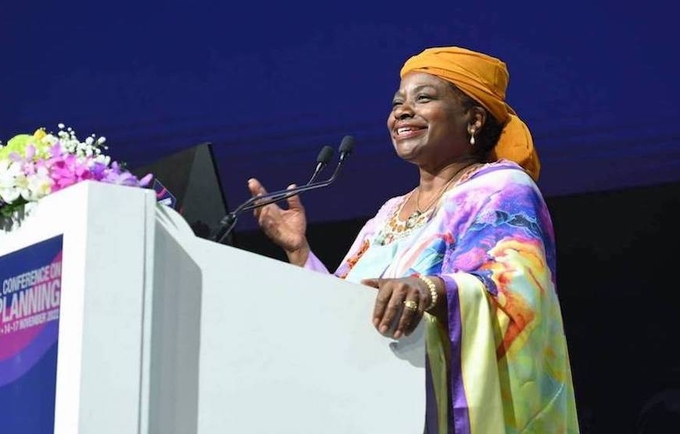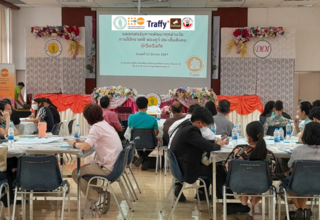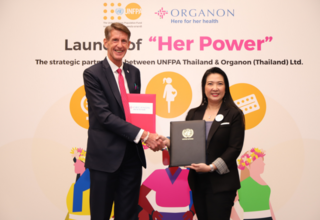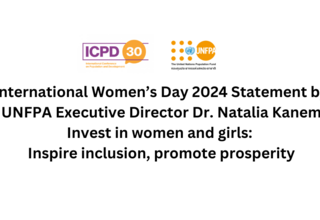(English below)
ถ้อยแถลงของ ดร.นาตาเลีย คาเนม ผู้อำนวยการบริหารกองทุนประชากรแห่งสหประชาชาติ เนื่องในวันยุติความรุนแรงต่อสตรีสากล ปี 2022
เมื่อเร็วๆ นี้ เราได้เฉลิมฉลองสัญญาณต่างๆ มากมายของความก้าวหน้า ในวาระที่ประชากรโลกมีจำนวนเพิ่มขึ้นจนถึง 8 พันล้านคน การมีสุขภาพที่ดีขึ้นและชีวิตที่ยืนยาวทำให้เรามาถึงจุดนี้ได้ ทว่า ยังมีความจริงที่น่าสลดใจ นั่นคือความก้าวหน้าที่ไม่เท่าเทียมกัน รวมทั้งความรุนแรงต่อสตรีและเด็กผู้หญิงซึ่งเกิดขึ้นอย่างเป็นระบบที่ลิดรอนศักดิ์ศรี ความเป็นอยู่ที่ดี และสิทธิในสันติภาพไปมากมาย
สิ่งนี้จะคงอยู่ตราบเท่าที่สิทธิและทางเลือกของผู้หญิงได้รับการปฏิบัติที่ต่ำมาตรฐานกว่าผู้ชาย และตราบเท่าที่ไม่มีสิทธิในร่างกายของพวกเขาเอง
ความรุนแรงต่อสตรีและเด็กผู้หญิงเกิดขึ้นทุกที่ มันเกิดขึ้นทั่วไปในบ้าน โรงเรียน ที่ทำงาน สวนสาธารณะ ขนส่งสาธารณะ สนามกีฬา และพื้นที่ออนไลน์เพิ่มขึ้นเรื่อยๆ ซึ่งทวีความรุนแรงขึ้นในบริบทของการเปลี่ยนแปลงสภาพภูมิอากาศและในช่วงสงคราม ไม่มีสถานที่ใดปลอดภัยอย่างสมบูรณ์สำหรับสตรีและเด็กผู้หญิง ความรุนแรงต่อพวกเขายังคงเป็นการละเมิดสิทธิมนุษยชนที่เรื้อรัง ร้ายแรงที่สุด และถูกมองข้ามมากที่สุดในโลก
อย่างไรก็ตาม เราสามารถป้องกันความรุนแรงต่อสตรีและเด็กผู้หญิงได้ เราสามารถหยุดวิกฤตนี้ได้ด้วยการแสดงความเป็นน้ำหนึ่งใจเดียวกันกับผู้คนซึ่งเพิ่มจำนวนมากขึ้นเรื่อยๆ ที่ลุกขึ้นยืนและพูดว่า “พอสักที” ทุกคนมีสิทธิในเนื้อตัวร่างกายและสิทธิในการดำรงชีวิตอย่างปลอดภัยและมั่นคงเท่ากัน
ในวันยุติความรุนแรงต่อสตรีสากลนี้ กองทุนประชากรแห่งสหประชาชาติ (UNFPA) ยังยืนหยัดร่วมกับพันธมิตรของสหประชาชาติและแคมเปญ UNiTE ของเลขาธิการสหประชาชาติ ในการเรียกร้องให้รัฐบาลและพันธมิตรลงมือดำเนินการเพื่อยุติความรุนแรงต่อสตรีและเด็กผู้หญิงในทุกความหลากหลายทันทีทันใด
การหยุดการแพร่กระจายของความรุนแรงที่เอื้ออำนวยโดยเทคโนโลยีกลายเป็นความสำคัญเร่งด่วน โลกออนไลน์เต็มไปด้วยการคุกคาม ความเกลียดชัง และการล่วงละเมิด ซึ่งบางส่วนลุกลามไปยังพื้นที่ทางกายภาพพร้อมกับผลที่ตามมาร้ายแรง จากข้อมูลของ Economist Intelligence Unit พบว่าผู้หญิงร้อยละ 85 มีประสบการณ์หรือพบเห็นความรุนแรงในโลกออนไลน์ โดยสัดส่วนนี้สูงขึ้นในที่ที่ความเหลื่อมล้ำทางเพศยังคงฝังรากลึกที่สุด อีกทั้งการล่วงละเมิดและอันตรายอาจเพิ่มขึ้นเนื่องจากปัจจัยที่ทับซ้อน อาทิ เชื้อชาติ ความทุพพลภาพ และศาสนา มาตรการป้องกันและตอบโต้ความรุนแรงทางเพศของเราต้องคำนึงปัจจัยเหล่านี้ด้วย
การรณรงค์เรื่องสิทธิในร่างกายของ UNFPA กำลังกระตุ้นให้ทั่วโลกตระหนักว่า โลโก้ขององค์กรธุรกิจและเนื้อหาที่มีลิขสิทธิ์อื่นๆ ได้รับการคุ้มครองในพื้นที่ออนไลน์มากกว่ามนุษย์อย่างไร การรณรงค์นี้ได้ช่วยเปิดตัวการเคลื่อนไหวระดับโลกที่หลากหลายเพื่อหยุดความรุนแรงที่เอื้ออำนวยโดยเทคโนโลยี โดยการเคลื่อนไหวนี้ได้เชื่อมประสานนักเคลื่อนไหวเพื่อสิทธิสตรีกับหน่วยงานกำกับดูแลของรัฐและภาคเอกชนที่ให้บริการเทคโนโลยี ในปีที่ผ่านมา Global Partnership for Action on Gender-Based Online Harassment and Abuse หรือความร่วมมือระดับโลกเพื่อดำเนินการยุติการล่วงละเมิดทางเพศในโลกออนไลน์ ถูกก่อตั้งขึ้นโดยมี UNFPA เป็นหนึ่งในแกนนำ ขณะนี้กำลังขับเคลื่อนให้เกิดความร่วมมือ ทัศนวิสัย และการเคลื่อนไหวใหม่ๆ
สัญญาณของการเปลี่ยนแปลงที่เพิ่มขึ้นอย่างเห็นได้ชัดคือกฎหมายความปลอดภัยในโลกออนไลน์ของสหราชอาณาจักรและสหรัฐอเมริกา นอกจากนี้สาธารณรัฐประชาธิปไตยประชาชนลาวก็ได้จัดหาเครื่องมือต่างๆ แก่ผู้ให้บริการเพื่อตอบสนองต่อความรุนแรงที่เอื้ออำนวยโดยเทคโนโลยี ตูนิเซียได้เปิดตัแอพพลิเคชั่นเพื่อช่วยให้เยาวชนท่องโลกออนไลน์ได้อย่างปลอดภัย และอาร์เจนตินาได้สอดแทรกประเด็นนี้ไว้ในหลักสูตรการสอนเพศวิถีศึกษา เป็นต้น
ภาคเอกชนก็เริ่มก้าวขึ้นมาเช่นกัน อาทิ บริษัทเทคโนโลยีบางแห่งนำเครื่องมือใหม่ๆ เข้ามาใช้ควบคุมการติดตามตำแหน่งและการแชร์ข้อมูลออนไลน์ ส่วนบริษัทอื่นๆ ก็กำลังปกป้องข้อมูลที่ระบุตัวตนเพื่อจำกัดการใช้ข้อมูลอย่างมีอคติและการใช้ข้อมูลเป็นอาวุธทำร้ายกัน
ทั้งหมดนี้เป็นจุดเริ่มต้นที่ดี แต่ยังมีสิ่งที่ต้องทำอีกมาก นอกเหนือจากกฎหมายและการตรวจสอบความปลอดภัยแล้ว สิ่งสำคัญไม่แพ้กันที่ต้องเปลี่ยนอย่างยิ่งคือวิธีที่เรามองสิทธิสตรีและเด็กผู้หญิงในการตัดสินใจเกี่ยวกับร่างกายของพวกเขาและการใช้ชีวิตโดยปราศจากความรุนแรง นั่นหมายถึงการทำลายบรรทัดฐานทางสังคมและเพศสภาพที่เป็นอันตราย และการทำลายทุกอุปสรรคขวากหนามต่อสิทธิเหล่านี้ โดยเริ่มจากกลุ่มคนชายขอบที่ตกเป็นเหยื่อของความรุนแรงและการเลือกปฏิบัติที่สาหัสที่สุด
ขอให้ทุกคนได้รับแรงบันดาลใจจากความมุ่งมั่นของนักเคลื่อนไหวจากทุกภาคส่วนและจากทั่วโลกซึ่งระดมกำลังและเดินหน้าสร้างความเปลี่ยน ด้วยความเป็นอันหนึ่งอันเดียวกันและด้วยความมุ่งมั่นแน่วแน่ ขอเชิญเข้าร่วมขบวนการสิทธิเนื้อตัวร่างกายเพื่อยุติความรุนแรงต่อสตรีและเด็กผู้หญิง เพื่อทุกคน เพื่ออนาคตตลอดไป
-----------------------------------------------------
This will persist as long as women’s rights and choices are treated as inferior to those of men, and for as long as their bodies are not considered their own.
Violence against women and girls happens everywhere. It prevails in homes, schools, businesses, parks, public transport, sport arenas and, increasingly, online. It escalates in the context of climate change and in times of war. For women and girls, no place is completely safe. Violence against them remains the world’s most chronic, most devastating, most overlooked violation of human rights.
Yet violence against women and girls is completely preventable. We can stop this crisis by acting in solidarity with the growing numbers of people who are standing up and saying “enough”. Everyone has the right to bodily autonomy and to live in safety and security.
On this International Day for the Elimination of Violence against Women, UNFPA stands with its UN partners and the United Nations Secretary-General's UNiTE Campaign in calling upon governments and allies to act now to end violence against women and girls in all their diversity.
Stopping the spread of violence facilitated by technology has become an urgent priority. The online world is awash in harassment, hatred and abuse, some of which spills over into non-virtual spaces with deadly consequences. An astonishing 85 percent of women experience or witness violence online, according to the Economist Intelligence Unit. The shares are even higher in places where gender inequality remains most deeply entrenched. And the abuse and harm may be compounded due to intersecting factors, such as race, disability and religion. Our gender-based violence prevention and response measures must also take these factors into consideration.
UNFPA’s bodyright campaign is galvanizing global awareness of how corporate logos and other copyrighted material enjoy greater protection online than human beings. It has helped launch a diverse global movement to stop technology-facilitated violence, one that links women’s rights activists with government regulators and private-sector tech providers. Created just one year ago, the Global Partnership for Action on Gender-Based Online Harassment and Abuse, which includes UNFPA among its leaders, is already driving new partnerships, visibility and action.
Mounting signs of change are evident in new online safety legislation in the United Kingdom and the United States. The Lao People’s Democratic Republic has adopted tools to equip service providers to respond to technology-facilitated violence. Tunisia has launched an app to help young people safely navigate the online world. Argentina has integrated the issue into comprehensive sexuality education curricula.
The private sector has begun to step up, too. Some tech companies have introduced new controls on online location tracking and data sharing, for example. Others are masking identifying information to limit biased and even weaponized use of data.
These are all good starting points, but much more needs to be done. Beyond laws and safety checks, as important as those are, we also need to radically transform how we view the rights of women and girls to make choices about their bodies and to live free from violence. This means disrupting harmful social and gender norms and dismantling every single barrier to these rights, starting with the most marginalized people who are subjected to the most acute violence and discrimination.
Let’s all draw inspiration from the commitment of activists across sectors and across the globe who are mobilizing and pushing forward, united and determined. Join the bodyright movement to end violence against women and girls, for all, for good.




